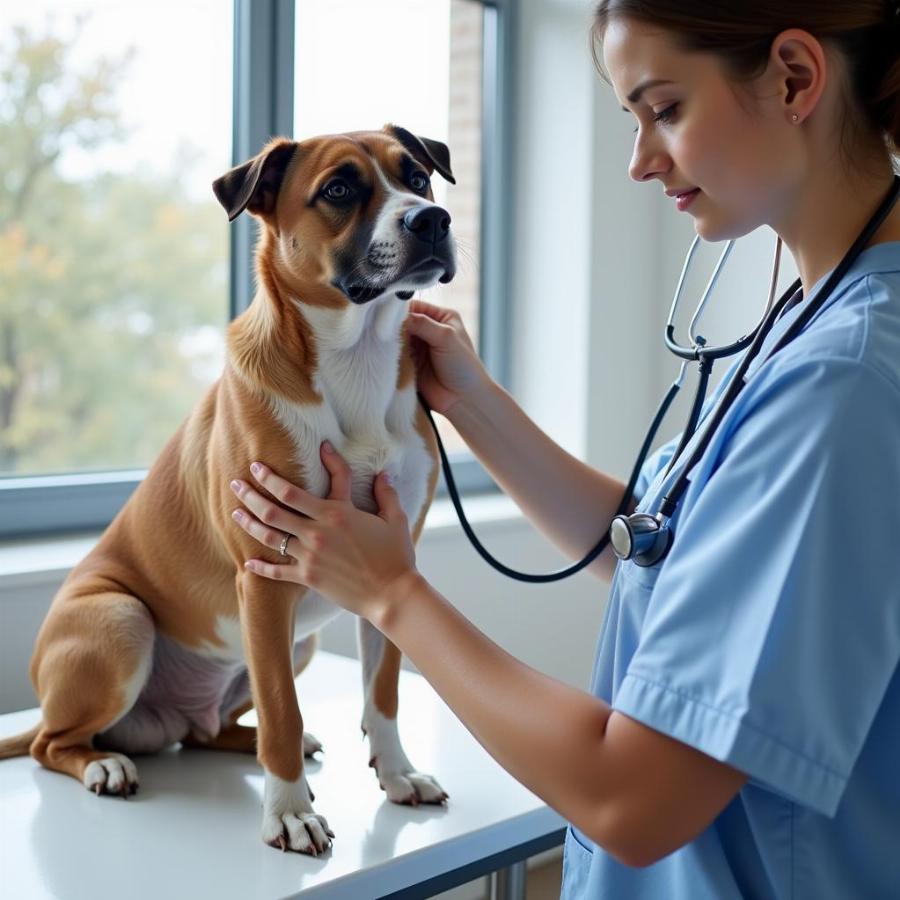Heavy breathing in dogs, also known as panting, is a normal physiological response with a variety of causes. While it’s often a simple sign of exertion or heat regulation, understanding the reasons behind your dog’s heavy breathing is essential for responsible pet ownership. This article will explore the various reasons why dogs breathe hard, helping you differentiate between normal panting and potential health concerns.
Understanding Normal Dog Panting
Dogs don’t sweat like humans do; they primarily regulate their body temperature through panting. This rapid, shallow breathing allows them to evaporate moisture from their tongues and the lining of their respiratory tracts, cooling them down effectively. So, if your dog’s been running around the park on a sunny day, heavy breathing is expected. Similarly, excitement and stress can also trigger panting. Think about how your dog breathes when you get home from work or when they see their favorite toy!
When Heavy Breathing is a Cause for Concern
While panting is generally normal, excessive or unusual panting can indicate an underlying medical issue. It’s crucial to pay attention to the context and accompanying symptoms. If your dog is panting heavily without any obvious trigger, such as exercise or heat, it’s time to consider other possibilities.
Recognizing Signs of Distress
Certain characteristics of your dog’s panting might suggest a problem. Is the panting unusually loud or labored? Are their gums pale or bluish? Are they exhibiting other signs of distress like drooling, restlessness, or collapsing? These are red flags that warrant immediate veterinary attention.
Potential Medical Reasons for Heavy Breathing in Dogs
Several medical conditions can cause heavy breathing in dogs. These include respiratory issues like asthma, pneumonia, and laryngeal paralysis. Heart conditions, such as congestive heart failure, can also lead to increased respiratory rate. Pain, anemia, and even heatstroke can also manifest as heavy panting. If you suspect a medical problem, consult your veterinarian as soon as possible. Early diagnosis and treatment are key to a positive outcome. Wondering if your dog’s allergies are the culprit? Find out more about do allergies in dogs cause panting.
Brachycephalic Breeds and Breathing Difficulties
Certain dog breeds, particularly those with short noses and flat faces, like Bulldogs and Pugs, are prone to breathing difficulties. This is due to their brachycephalic anatomy, which often involves narrowed nostrils and elongated soft palates. These breeds require extra care, especially in hot weather, and you should monitor their breathing closely. For more information on breeds with longer snouts, check out our article on dog breeds with long snouts.
What to Do If Your Dog Is Breathing Hard
First, assess the situation. Has your dog been exercising or is it hot outside? If not, examine their gums and look for other signs of distress. If you’re concerned, don’t hesitate to contact your vet. It’s always better to be safe than sorry, and prompt veterinary attention can be life-saving. You might also be interested in reading about why is my dog breathing weird.
Conclusion
Understanding why dogs breathe hard is vital for any dog owner. While panting is a natural and essential function, it can also be a sign of a serious problem. By recognizing the difference between normal and abnormal panting, you can ensure your furry friend receives the appropriate care and attention they need to thrive. Remember, if you’re ever unsure, consult your veterinarian. Is your dog’s breathing accompanied by snoring? Learn more about is it normal for a dog to snore.
FAQ
- Is panting always a sign of a problem? No, panting is a normal way for dogs to regulate their body temperature and cope with excitement or stress.
- When should I be worried about my dog’s panting? If the panting is excessive, labored, accompanied by other symptoms, or occurs without an obvious trigger, you should consult a vet.
- What can I do to help my dog if they’re panting heavily? Move them to a cool, shaded area, offer them small amounts of water, and contact your veterinarian.
- Can medications cause heavy breathing in dogs? Yes, certain medications can have panting as a side effect. Always consult your vet about potential side effects.
- Are certain breeds more prone to breathing problems? Yes, brachycephalic breeds are more susceptible to breathing difficulties due to their facial structure.
- How can I tell if my dog is overheating? Signs of overheating include excessive panting, drooling, weakness, and bright red gums.
- What is the difference between panting and labored breathing? Panting is rapid and shallow, while labored breathing is slower, deeper, and may involve the whole chest and abdomen. Learn about panting while resting in our article why is my dog breathing so fast while resting.
Related Questions
- What if my dog is breathing fast but not panting?
- How can I monitor my dog’s breathing at home?
- Are there any supplements that can help with breathing problems in dogs?
 Veterinarian examining a dog
Veterinarian examining a dog
Beaut Dogs is your trusted source for all things related to dog breeds, care, and well-being. We’re dedicated to providing accurate and helpful information to empower you to be the best pet parent possible. When you need assistance, please contact us via Email at [email protected] for detailed and accurate answers from Beaut Dogs. Visit us at https://beautdogs.com.